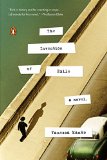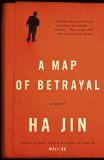Summary | Excerpt | Reading Guide | Reviews | Beyond the book | Read-Alikes | Genres & Themes | Author Bio

A Novel
by Vanessa MankoIt is hard to believe that Vanessa Manko hasn't been an immigrant herself, given her ability to put herself in the shoes of one and imagine the humiliations and gradual descent into paranoia brought on by years of living in a constant state of expectation.
Austin Voronkov, the protagonist of The Invention of Exile, is a Russian-born man who, in 1920, after seven years of law-abiding life in the United States, is deported back to the Soviet Union under the false accusation of anarchism. In love with Julia, one of his landlady's daughters, Austin marries her before being deported, and she agrees to leave with him. The young couple goes to the village of Austin's parents, where, for two years they live a modest life - albeit not without dangers in a country ravaged by civil war - until the Red Army chases them out of their home. About to be shot, they are spared when the Commissar discovers that Austin had been his childhood playmate. Freed, they take again to the road of exile, to Turkey, where Julia gives birth to their first child, Aussie; and then to France, where two other children, Leo and Vera, follow.
While their years in France are briefly touched upon, the Voronkovs' saga is described in rich detail after their arrival in Mexico in 1927. (Be assured, there are no plot spoilers here.) At first, the family lives in a lighthouse by the beach - a small paradise reminiscent of Robinson Crusoe's self-contained world; then they move to Cananea, where Austin works as a foreman in a copper mine. Soon, they are led to believe that if Julia and the children return to the States, it will be much easier to convince the American authorities to let Austin reunite with his family. Thus, in 1934, Austin's wife and their three children move to her family home in Connecticut, and Austin expects to follow them in two months.
But a year passes, and then two, and he is not allowed to cross the border because of the previous accusation of anarchism. He moves to Mexico City, where he rents a room in a boardinghouse and survives by doing small repairs to various household items. Obsessed with the idea that he is being watched by a certain Jack connected with the U.S. government, Austin constantly creates monologues in his head between Jack and himself. For fourteen years his life consists of writing letters to Julia, going to the post office, and working on what he calls his "inventions" – various engineering designs that will be, he believes, awarded patents, and which will convince the American authorities that he deserves to be admitted into the country. This ascetic, solipsistic life is described pitch-perfectly by the author, and the reader can easily imagine its tragedy, the slow degradation of a man who is deprived of any companionship.
Written in a non-linear way, The Invention of Exile starts in 1948 in Mexico City and ends the same year, after Vera's arrival in Mexico, where she has arranged to work temporarily for a company. Her brother Leo arrives shortly afterwards, and soon it becomes clear that the two have a plan to help their father get out. The story, which, up to this point, has been rather slow, suddenly moves faster, and the ending comes as a surprise.
The Invention of Exile is based on the life of Vanessa Manko's grandfather, who, like Austin, lived in Mexico for many years without being allowed to return to the United States. Manko's father had been born in Mexico, but moved to the US when he was a child and grew up without a father. The author herself never met this grandfather, who ended up dying in Mexico. An intelligent, subtle and well-written novel, The Invention of Exile proves how absurd laws, grotesque bureaucracies and pointless boundaries can destroy innocent lives.
![]() This review was originally published in The BookBrowse Review in October 2014, and has been updated for the
August 2015 edition.
Click here to go to this issue.
This review was originally published in The BookBrowse Review in October 2014, and has been updated for the
August 2015 edition.
Click here to go to this issue.

If you liked The Invention of Exile, try these:

by Ha Jin
Published 2015
From the award-winning author of Waiting and War Trash: a riveting tale of espionage and conflicted loyalties that spans half a century in the entwined histories of two countries—China and the United States—and two families.

The Ice Cream Queen of Orchard Street
by Susan J. Gilman
Published 2015
In 1913, little Malka Treynovsky flees Russia with her family. Bedazzled by tales of gold and movie stardom, she tricks them into buying tickets for America. No sooner than they land does Malka find herself crippled - and yet survives to shape her own destiny.
When men are not regretting that life is so short, they are doing something to kill time.
Click Here to find out who said this, as well as discovering other famous literary quotes!
Your guide toexceptional books
BookBrowse seeks out and recommends the best in contemporary fiction and nonfiction—books that not only engage and entertain but also deepen our understanding of ourselves and the world around us.